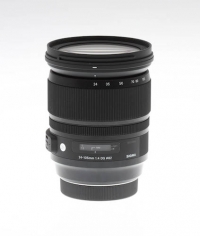Sigma ordered to pay $14.5 million in compensation to Nikon for lens stabilization patent infringement
posted Tuesday, March 11, 2014 at 4:06 PM EDT

In a lawsuit that has been going on for more than two and a half years, Sigma has ultimately been found guilty of infringing on a patent describing a technology used in Nikon's 'Vibration Reduction' optical image stabilization system. Tokyo District Court Judge in Chief Shigeru Osuga found that Sigma's optical image stabilization system uses 15% of Nikon's patented VR technology, and thus awarded Nikon the same amount of Sigma's profits made from the accused products – six lenses that aren't further specified – in compensation. The total sum that the court awarded to Nikon is JPY1.5bn, which is about US$14.5m at current exchange rates.
When Nikon originally filed the lawsuit back in May 2011, it sought for a total of JPY12.4bn (US$120m) in compensation from Sigma, after the two companies failed to come to an agreement outside of court. In January 2013 then, the lawsuit was dismissed by the same Tokyo District Court judge, arguing that Nikon had failed to present sufficient evidence. In that regard, the latest ruling against Sigma is an interesting turn of events with a potential impact on Sigma's ability to compete with optically stabilized lenses in the future. Because unless Sigma is going to appeal the ruling, it will have to pay royalties to Nikon for all future lenses featuring the same stabilization technology.
Alternatively, Sigma could research other image stabilization technologies, but either way it could likely have an adverse effect on the final price the consumer has to pay for Sigma's lenses. A last resort for Sigma would be to ditch optical image stabilization entirely, which would make the company uncompetitive on the lens market. This can't possibly be what Sigma has in mind, seeing as it just won a lot of ground against the big two – Canon and Nikon – in terms of quality of its lenses in the past couple years. It's latest constructions are marvels of optical design and can easily compete with, if not outperform, similar offerings by the original equipment manufacturers.
It is safe to assume, thus, that Sigma will appeal the ruling – provided that is possible in the Japanese legal system. If it is not, then Sigma is in real trouble as it will have to find a way to continue to offer lenses with optical image stabilization, however without further patent infringement or huge sums of royalty payments. So this story is far from over, and we will surely hear more in the not-too-distant future. Until then, it might not be the worst idea to buy one of Sigma's stabilized lenses, just in case they won't be made anymore in the future.
(via Nikon Rumors)